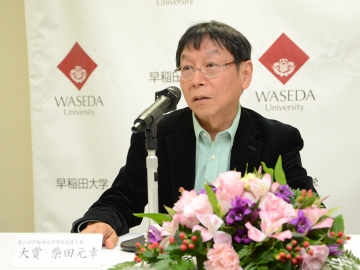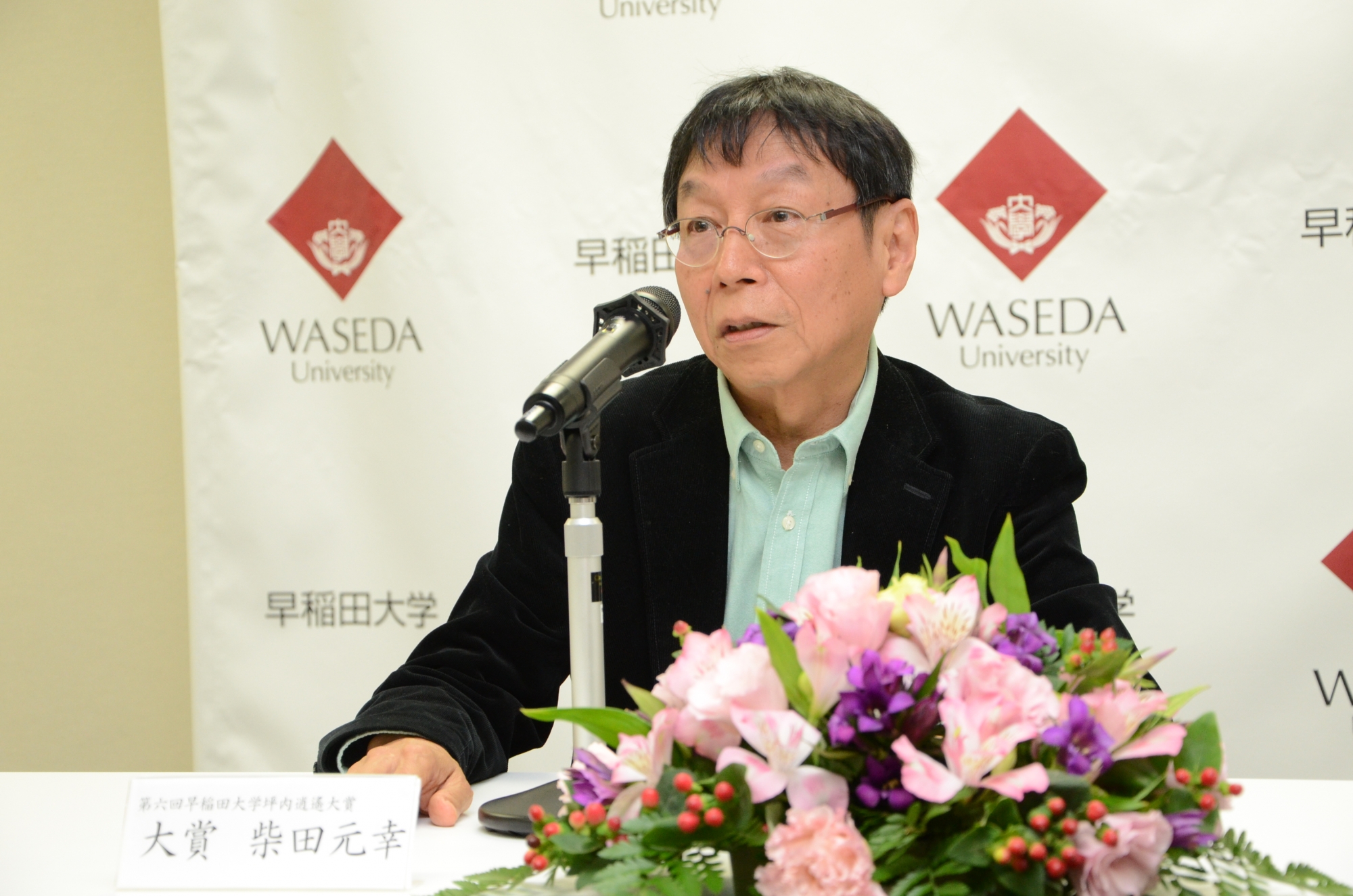Motoyuki Shibata named winner of the 2017 Tsubouchi Shoyo Award
Fri, Oct 6, 2017-
Tags

Motoyuki Shibata, winner of the 2017 Tsubouchi Shoyo Award
On October 2, Waseda University announced Motoyuki Shibata, a scholar of American literature and translator, as the recipient of the 2017 Tsubouchi Shoyo Award. American poet Arthur Binard received an honorable mention.
The Tsubouchi Shoyo Award, given once every two years, was established by Waseda University in 2007 to commemorate the university’s 125th anniversary and celebrate the achievements of Dr. Shoyo Tsubouchi, the founder of the School of Literature who was the first to translate the complete works of Shakespeare into Japanese. Selected by a selection committee made of writers, literary critics, and university professors, the award honors distinguished works in literature, culture, and the arts.
Shibata, born in Tokyo in 1954, was a professor of American literature at the University of Tokyo and currently serves as editor of the literary magazine Monkey. He has won literary awards including one from the Japan Society of Translators for his translation of Mason & Dixon (1997) by Thomas Pynchon.
“Mr. Shibata has long translated works from English to Japanese. Since the Meiji Period, Japanese culture has grown through influences of other countries by means of translation, and among these translated works, Mr. Shibata’s are one of the greatest in volume and the best,” pointed out Genichiro Takahashi, Meiji Gakuin University professor and chairman of the selection committee, when asked about Shibata’s winning the award. “Mr. Shibata came up with new words as a translator, opening up new possibilities in the Japanese language and literature. Shoyo Tsubouchi himself set the foundation of modern Japanese literature through his translations, critiques, and original works, which is the exactly why Mr. Shibata is the right person for this award.”
At the press conference, Shibata said, “During the Meiji Period, Shoyo Tsubouchi translated the complete works of Shakespeare into something that was well-worth reading in a time when Shakespearean research had not progressed and Japanese translations did not exist. As a translator, I feel honored to have received this award under his name.” Past recipients of the award include Haruki Murakami, Yoko Tawada, Hideki Noda, Yoko Ogawa, and Hiromi Ito, who are all internationally-acclaimed writers. “By becoming an addition to this group of talented creators, I feel that not only myself but the very existence of translators has become recognized.”
Honorable mention went to Arthur Binard, an American poet born in Michigan in 1967. After studying English literature at Colgate University, he came to Japan in 1990 and has written poems in Japanese ever since. Binard has received several literary awards, including the Nakahara Chuya Award for his poetry collection Tsuriagetewa. He is also known to translate picture books.
“Since his arrival in 1990, Mr. Binard’s literary activities, ranging from poetry, essays, picture books and to lectures, are incomparable in terms of its dynamism and quality of the achievement’s depth and influence,” said Waseda professor and selection committee member Norihiro Kato. Based on a radio program by Nippon Cultural Broadcasting, Binard recently published a book on the Japanese and Japanese American experiences of the war and postwar times, which previously had not shed light. “This particular publication marks the 27th year of Mr. Binard’s career. On this occasion, we show our appreciation and respect for his linguistic adventures in Japan that started from scratch.”
On receiving the recognition, Binard said in a statement that although he immediately felt the weakness of his writing when faced with the achievements of Shoyo Tsubouchi’s novels, scripts, and critiques in addition to the Shakespearean translations, he was able to gradually build his artistic expressions by immersing himself with English translations of Japanese poems and Japanese translations of American poems. “This unexpected of opportunity of receiving honorable mention will be a driving force behind bigger projects in the future. I feel extremely motivated.”
The award ceremony and reception will take place the Rihga Royal Hotel in Tokyo on November 6.
Past recipients of the Tsubouchi Shoyo Award
- 2007: Haruki Murakami and Mieko Kawakami (honorable mention)
- 2009: Yoko Tawada and Nobori Kikuchi (honorable mention)
- 2011: Hideki Noda and Toh Enjoe (honorable mention)
- 2013: Yoko Ogawa, Masatsugu Ono (honorable mention), and Wataru Yamada (honorable mention)
- 2015: Hiromi Ito and Shin Fukunaga (honorable mention)














